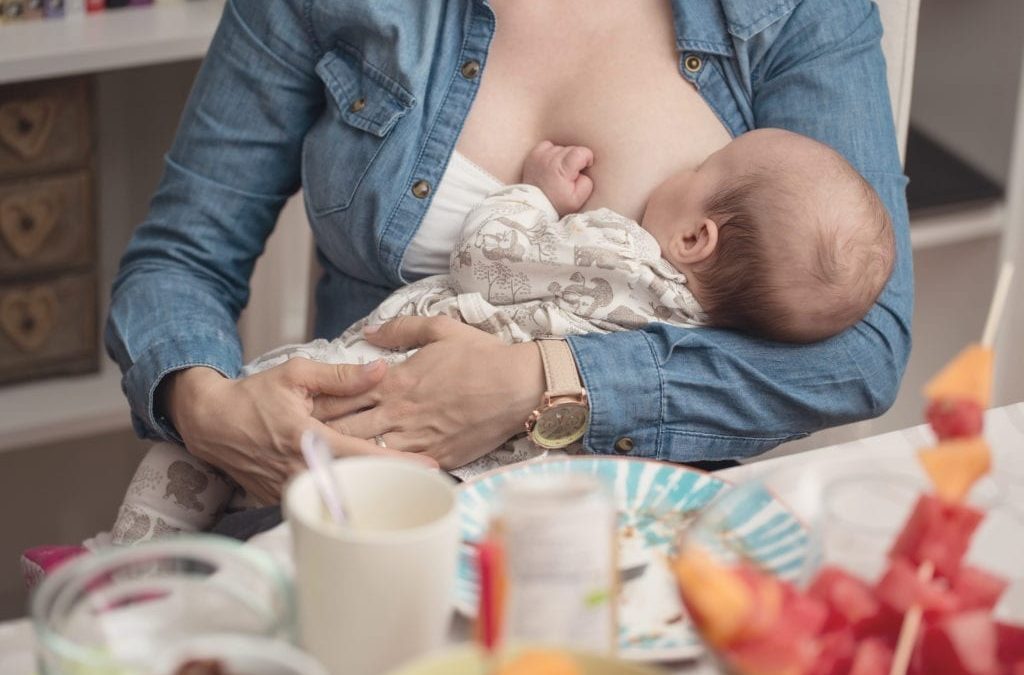You just spent nine months “eating for two,” and now that you are breastfeeding or pumping, you aren’t quite done yet. Your body is designed to make breast milk for your little one that is perfectly balanced in carbohydrates, protein and fat.
Moms who don’t eat nutritiously still provide their little ones with perfect breast milk because the body taps into its own reserves to make the milk. Unfortunately, while your diet won’t affect your little one’s milk, it will affect your own health. Eating a healthy, balanced diet is the best way for both you and your little one to get the nutrition you need.
How to Eat Healthy Without Affecting Your Milk Supply
Your body works hard to make breast milk for your little one. You will need to consume 400 to 500 more calories a day in order to provide your body with the energy to make breast milk. This increase in caloric needs is why you may feel extra hungry while you are nursing.
Though there is no specific “breastfeeding diet” to follow, nutritionists recommend that breastfeeding moms try to get the following servings of food per day for optimal health:
- 3 to 4 servings of healthy whole grains and complex carbohydrates, such as brown rice, whole wheat bread, sweet potatoes and oatmeal
- 4 to 5 servings of whole fruits and vegetables, such as carrots, peas, apples and tomatoes
- 1 or more servings of iron-rich foods, such as red meat and spinach
- 3 servings of proteins, such as chicken breast, eggs, fish, turkey and lean pork cuts
- 5 servings of calcium, such as milk, yogurt and cottage cheese
- 1 to 2 servings of healthy fats, such as olive oil, coconut oil and avocados
- 2 to 3 servings per week of omega-3 rich foods, such as salmon and walnuts
Eating a well-balanced diet will help ensure that you don’t become deficient in any nutrients. Because your breast milk actually takes on the different flavors and scents of the foods you eat, some experts believe that eating healthy while you are nursing can expose your little one to a variety of different foods, which can make your baby more willing to eat a wider variety of foods when he or she is ready for solids.
Though your body is designed to continue to make breast milk even during times of famine or hardship, if you don’t eat enough calories or you avoid eating whole food groups, your milk can suffer over time.
Tips and Advice for Healthy Eating
- Eat a small meal or a snack approximately every three hours to keep you from feeling hungry and to keep your energy levels high
- Plan and prepare snacks ahead of time while your little one naps in order to avoid grabbing an unhealthy option when hunger strikes
- Stash healthy snacks near the rocker where you breastfeed, in the diaper bag and with your breast pump in case you get hungry while nursing or pumping
- Make a list of foods that seem to affect your little one and keep it on the fridge for easy reference
- Don’t focus on counting calories; eat when you are hungry and stop as soon as you are satisfied because your caloric needs can increase/decrease depending on your little one’s hunger levels
Foods to Avoid
The good news is that you can relax on the dietary rules that your doctor gave you during pregnancy. This means that it’s now okay to occasionally eat/drink:
- Coffee (try to drink right after nursing/pumping to avoid your little one getting too much caffeine)
- Alcohol (try to drink right after nursing or pumping so that your body can metabolize it before breastfeeding again)
- Soft cheeses
- Shellfish
- Sushi
Unfortunately, while most foods are no longer off-limits, you will quickly learn that your little one’s body can’t handle some of the foods that you eat. It typically takes anywhere from two to six hours for the foods you eat to make it into your breast milk. Your little one may because extra fussy, gassy or have diarrhea after you eat the following:
- Broccoli
- Cauliflower
- Onion
- Garlic
- Chocolate
- Spices
- Strawberries
- Kiwifruit
- Pineapple
- Melons
Weight Loss and Breastfeeding
After nine months of not fitting into your pre-pregnancy jeans, you probably can’t wait to get your pre-pregnancy body back. It is possible to lose weight while breastfeeding, but it’s a good idea to not cut back until your little one is about two months old. By this time, your milk supply should be well-established and you can safely try to lose weight by cutting 200 to 300 calories from your diet each day.
A safe amount of weight to lose while breastfeeding is one pound per week. Avoid crash or fad diets that severely cut calories or food groups and promise large amounts of weight loss as these can harm the quality and quantity of your milk over time.
Being able to provide your little one breast milk through nursing or pumping is the best way to give your baby the best nutritious start in life. Eating a healthy diet, drinking plenty of water and continuing to take your prenatal vitamin each day will give you and your little one all of the nutrients and vitamins you need for optimal health.


